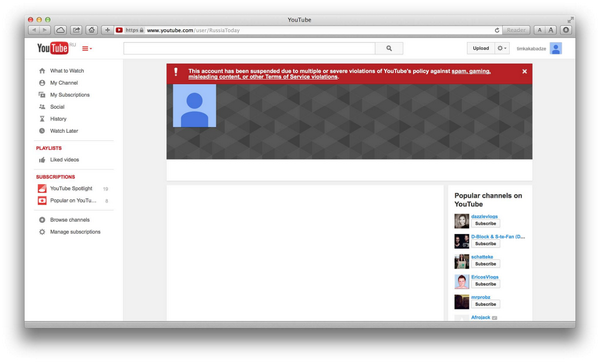
Screenshot of RT's YouTube account suspended for violating Terms of Service.
On March 19, 2014, YouTube temporarily suspended its most popular channel, Russia's state-owned, English-language media company RT (formerly Russia Today). Viewers attempting to access the account found instead the message displayed above, which said RT's page “been suspended due to multiple or severe violations of YouTube's policy against spam, gaming, misleading content, or other Terms of Service violations.” Google was quick to apologize to RT, calling the temporary suspension a “technical error” and restoring the popular media company's account and administrative privileges within several hours.
Glitches happen, and Internet users generally shrug them off as innocent mistakes. But with tensions at fever pitch [GV Report] between the West and Russia over the latter's annexation of Crimea, the apparent decision of a Western company (YouTube is owned by Google) to block a Russian media outlet was seen as the latest skirmish in an ongoing information war. Roskomnadzor, Russia's communications watchdog, probably exacerbated the situation when it recently acted on the Russian Attorney General's orders to force ISPs to block access [GV Report] to several independent websites, including the LiveJournal page of Alexey Navalny, Russia's most prominent political blogger.
The RuNet's sizable contingent of anti-American netizens was quick to jump on the apparent muzzling of RT as a sign of the West's double standards on freedom of speech. Stanislav Apetyan, who runs the popular pro-Kremlin blog, Politrash [ru], was quick to quip [ru].
YouTube демократично заблокировал аккаунт Russia Today в разгар кризиса на Украине https://t.co/DvOwdP5iJP Свобода слова она не для всех.
— Stanislav Apetyan (@politrash) March 18, 2014
YouTube democratically blocked Russia Today's Account at the culmination of the crisis in Ukraine. Freedom of speech isn't for everyone.
Aleksandr Slavyaninov, whose avatar demonstrates a clear penchant for Soviet nostalgia, also took the opportunity to needle [ru] the US.
Ютуб заблокировал канал “Россия сегодня”. А вообще США против цензуры в любой её форме.
— Александр Славянинов (@redhunky) March 18, 2014
Youtube blocked Russia Today's channel. And the US is against censorship in any form.
Russia's liberals on the other hand, seemed to be torn between their principles and a clear opportunity for schadenfreude at a Kremlin-friendly station's troubles—no doubt remembering how many cable providers recently dropped [GV Report] Russia's only independent TV station, TV Rain, in what was seen as a politically motivated move.
RIP Novosti, a parody account based on the recently liquidated [GV Report] state media group RIA Novosti sarcastically suggested [ru] that blocking was a boon to patriotically minded Russians who wish to boycott American goods—an allusion to a Russian businessman who was widely mocked [ru] for tweeting [ru] from his iPhone that he planned to remove all American goods from his life.
Ютуб заблокировал Russia Today, чтобы им было проще отказаться от американских товаров.
— RIP Новости (@riarip) March 18, 2014
YouTube blocked Russia today to make it easier for them to stop using American goods
Most liberals seemed to take little pleasure in the turn of events. Ekaterina Vinokurova, a journalist at opposition news portal Znak.com tweeted [ru] simply.
Я против цензуры, поэтому считаю отключение RT на Youtube несправедливым
— Ekaterina Vinokurova (@k_vinokurova) March 18, 2014
I'm against censorship and therefore consider the closure of RT on YouTube to be unjust.
Not everyone agreed. Responding to a (since deleted) Facebook post by TV Rain's chief editor, Ilya Klishin, that criticized censorship on YouTube, journalist Roman Dobrokhotov reckoned [ru] that RT had lost its right to free speech since the Kremlin has stripped others of the same freedom. When someone suggested that this made him no different from the Kremlin, Dobrokhotov argued [ru] that blocking RT on YouTube was a form of self-defense and was not equivalent to Roskomnadzor blocking oppositionist blogs.
@OsmiyPanda @Vorewig Простая аналогия: убивать людей плохо, но когда наши войска убивали вторгшихся нацистов, они не уподоблялись нацистам.
— Roman Dobrokhotov (@Dobrokhotov) March 18, 2014
@OsmiyPanda @Vorewig A simple analogy: killing people is bad, but when our forces killed the invading Nazis it didn't turn them into Nazis themselves.
Ilya Yashin, one of Russia's most prominent oppositionists, was more concerned [ru] with the move as an apparent tactical blunder.
А если серьезно, блокировка RT это плохое решение. На наши аргументы про цензуру в РФ кремлевская пропаганда будет орать: “А вот у них там”
— Илья Яшин (@IlyaYashin) March 18, 2014
If I could be serious, blocking RT is a bad decision. Kremlin propaganda is going to respond to all our arguments about censorship in Russia with “Well look what goes on over there.”
Strangely, it seems it didn't occur to nearly anyone that blocking its most popular channel might contradict YouTube's commercial interests. Neither did Russian Internet users appear to question the US government's inclination, much less its ability, to force a company as large as Google to cease broadcasting a foreign news channel, simply because of editorial disagreements. Most bloggers appeared to be fully convinced that YouTube had indeed blocked RT's account, without any intention of restoring it. Whatever the geopolitical results of Russia's Crimea grab, today's information war with the West is real for many on the RuNet. Under the influence of such perceptions, netizens of every stripe in Russia now are prepared to judge and interpret anything online as an attack or a conspiracy.







